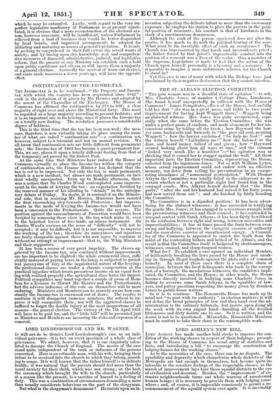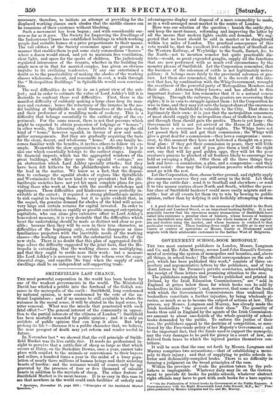LORD ASHLEY'S NEW BILL.
LORD ASHLEY has made another bold stroke to improve the con- dition of the working classes in respect of their lodgings ; present- ing to the House of Commons his usual array of statistics and facts, and introducing a bill "to encourage the construction of lodging-houses for the working classes." As to the necessities of the case, there can be no dispute. The squalidity and depravity which characterize whole districts of the Metropolis are bad enough in themselves, but become quite in- tolerable to the sensitive feelings of the respectable classes, as the march of improvement lays bare those squalid districts to the eye of civilization and decorum. Besides, the " improvement " of ex- tensive neighbourhoods turns out whole warrens of unredeemed human beings ; it is necessary to provide them with lodging some- where ; and, of course, it is impossible consciously to permit a re- commencement of the squalid system over again. It is inevitably necessary, therefore, to initiate an attempt at providing for the displaced working classes such abodes that the middle classes can be conscious of their existence without blushing.
Such a movement has been begun; and with considerable suc- cess so far as it goes. The Society for Improving the Dwellings of the Industrious Classes has established buildings in which working people find suitable homes at a price proportionate to their means. The tall edifices of the Society economize space of ground in a manner that enables them to put some sixty commodious " houses " where a dozen would stand, and yet to maintain free ventilation, clear light, and space for the sports of children. The judiciously regulated intercourse of the tenants, whether in the building for single men or in that for married couples, has given an obvious impulse to its civilizing tendencies. If any one entertained a doubt as to the practicability of making the abodes of the working classes wholesome decent, and reasonable in cost, a walk through the "Metropolitan Buildings" in Spitalfields would soon convince him.
The real difficulties do not lie in an 5. priori view of the sub- ject; and in order to estimate the value of Lord Ashley's bill it is desirable to confront those real difficulties. First, there is the manifest difficulty of suddenly makina.° a large class drop its man- ners and customs ; hence the reluctance of the inmates in the mo- del building at Spitalfields to avail themselves of the cook-shop, and their preference of a muddling mode of cookery. This is a difficulty that belongs essentially to the earliest stage of the ex- periment. For the same reason, there is not that pressure which might be expected to obtain possession of lodgings or " houses "; in other words, the labouring classes hesitate to give up the old kind of "home," however squalid, in favour of new and unfa- miliar arrangements But they are gradually acquiring the taste for the clean, decent, and wholesome "home.' As one family be- comes familiar with the benefits, it invites others to follow its ex- ample. Meanwhile the slow appreciation is a difficulty ; but it is also one which essentially belongs to the earliest stages. Impoli- tic financial imposts, which tax the aggregated 'windows of the great buildings, while they spare the squalid "cottage," are an obstruction which Lord Ashllsapecially attacks; but they have been felt hitherto by the philanthropists -who are taking the lead in the matter. We know as a fact, that the disposi- tion to exchange the squalid abodes of regions like Spitalhelds and Westminster for the new kind is very prevalent; but the phi- lanthropic societies have not yet hit upon complete plans for pro- viding those who work at home with the needful workshops and appliances. These difficulties and hinderances were perfectly in- evitable at the outset ; it required a strong philanthropic motive to risk capital in braving them; but it is quite evident that, in the sequel, the genuine demand for abodes of the kind will secure very large and certain returns for capital invested. In order to produce that conviction as rapidly as possible amongst enterprising capitalists, who can alone give extensive effect to Lord Ashley's benevolent measure it is very desirable that the difficulties which beset the undertaking should be made as distinct and clear as pos- sible; because then they will be seen in their true character, as difficulties of the beginning only,. certain to disappear as time familiarizes projectors with the inevitable needs of the working classes—the working classes with the substantial benefits of the new style. There is no doubt that this plan of aggregated dwell- ings solves the difficulty suggested by the joint facts, that the Me- tropolis is extending, that the working classes are multiplying, and that they ought to reside near their work : but a measure like Lord Ashley's is necessary to carry the reform over the expe- rimental stage, and expedite the time when the supply of such dwellings shall be an independent self-supporting trade.



























 Previous page
Previous page